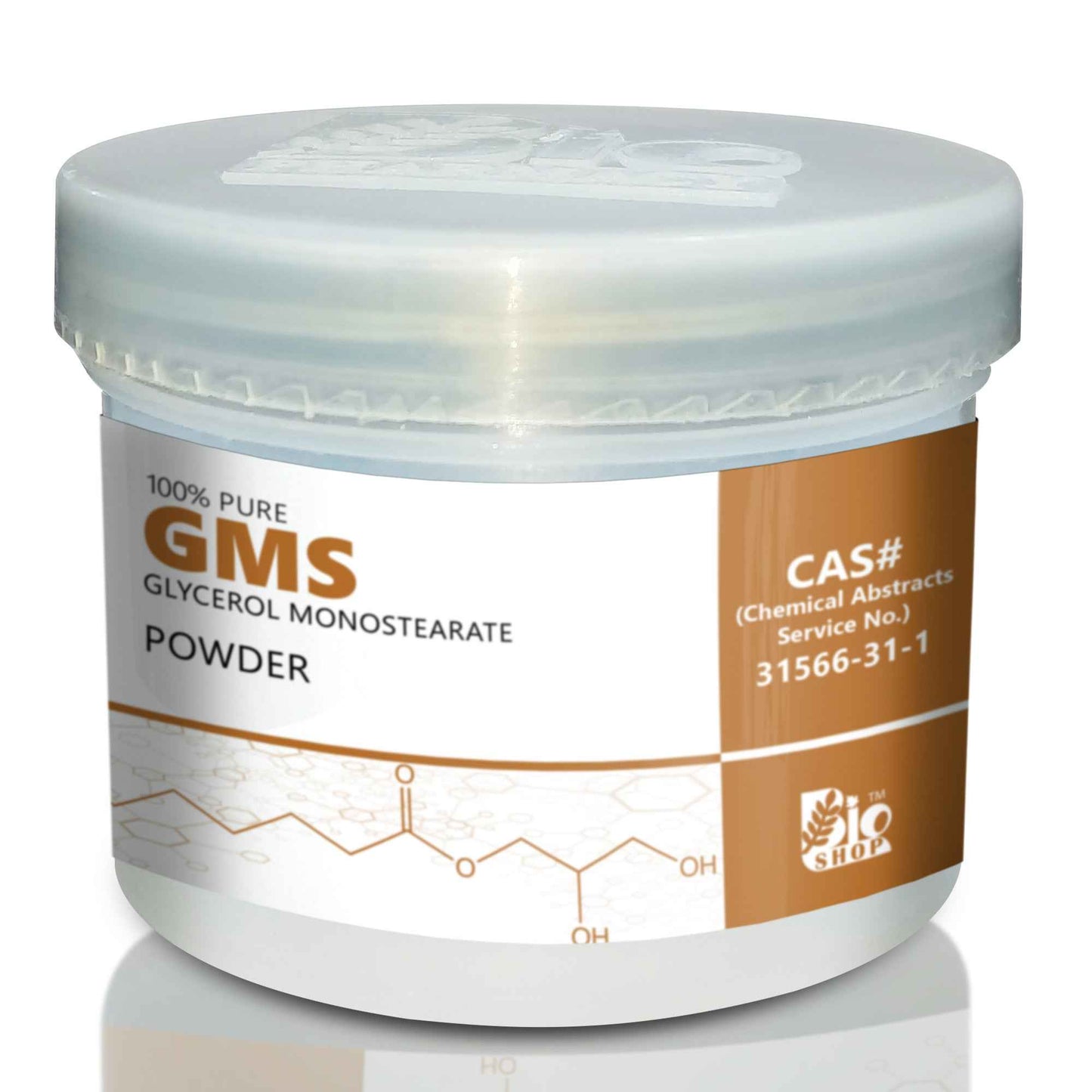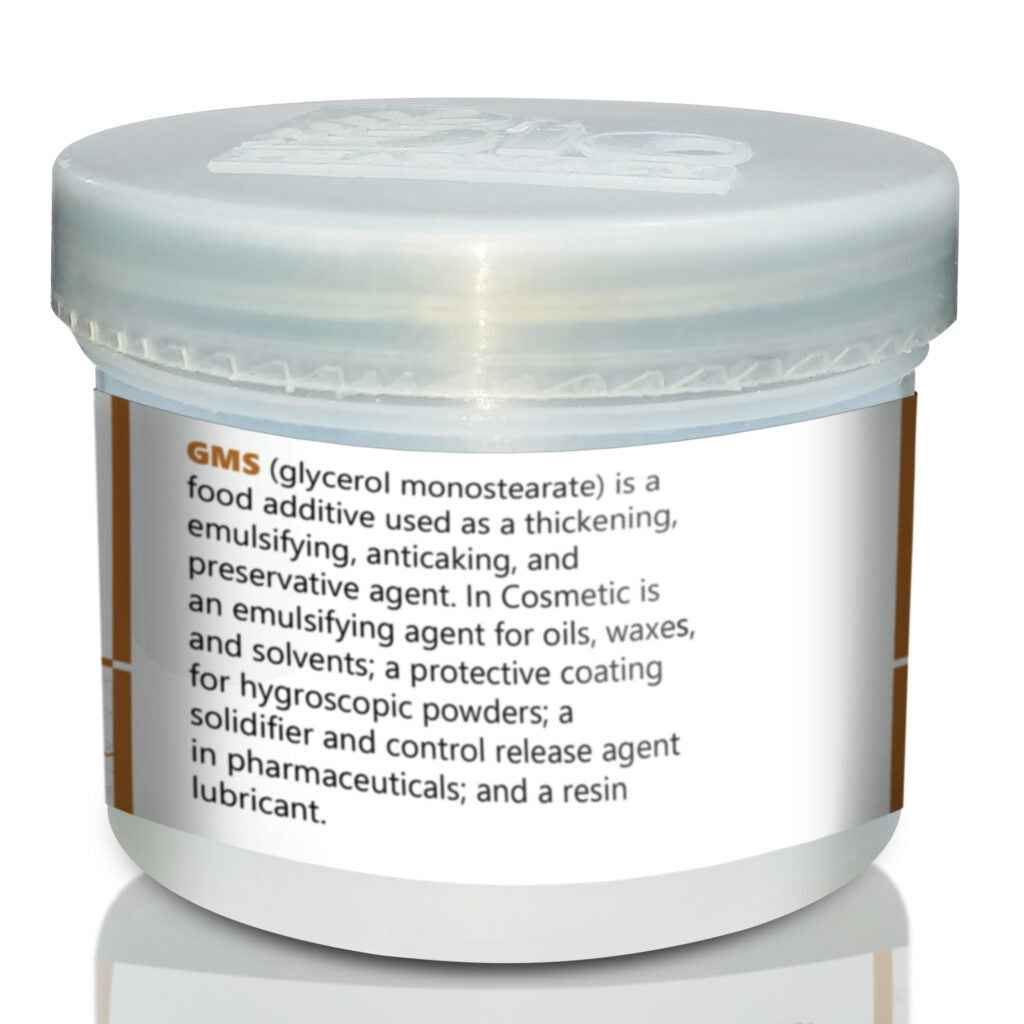Bio Shop
GMS (Glycerol Monostearate) Powder
GMS (Glycerol Monostearate) Powder
Key Functions: Functions as a non-ionic emulsifier, emollient, and thickening agent in oil-in-water formulations.
Couldn't load pickup availability


Explore
Information About GMS (Glycerol Monostearate) Powder
✅ Key Features
- Acts as an emulsifier and stabilizer for creams and lotions
- Improves viscosity and texture in skincare formulations
- Enhances spreadability and moisturization
- Suitable for both hot and cold process emulsions
- Safe and versatile for cosmetic applications
🔬 Description
GMS Powder (Glycerol Monostearate) – Emulsifier & Opacifier for Creams and Lotions
Glycerol Monostearate (GMS) is a waxy, white flake or powder that works as an excellent non-ionic emulsifier and thickening agent in oil-in-water emulsions. Commonly used in lotions, creams, conditioners, and serums, it helps stabilize formulations and improve their texture. GMS also enhances the moisturizing effect by forming a protective layer on the skin or hair. Ideal for beginner and professional formulators alike, it can be used with other emulsifiers like cetyl alcohol or stearic acid for enhanced results.
📊 Technical Data
INCI Name: Glycerol Monostearate
CAS Number: 31566-31-1
Solubility: Dispersible in hot water, soluble in oils
Add Phase: Oil phase (heat required)
pH Stability: 4.5 – 8.0
Processing Temperature: 70°C – 75°C
Appearance: White powder or flakes
Odor: Mild, fatty odor
Molecular Formula: C21H42O4
Molecular Weight: ~358.57 g/mol
Flash Point: >200°C
Density: ~0.97 g/cm³
Chemical Type: Monoester
Functional Groups: Ester
Primary Cosmetic Uses: Emulsions, creams, lotions, hair conditioners
🧪 Recommended Usage
- Usage Rate: 1% – 10%
- Recommended Pairings: Cetyl alcohol, Stearic acid, Cetearyl alcohol
- Storage: Store in cool, dry place away from moisture
💡 Pro Tip
Use GMS in combination with cetyl alcohol for better texture and stability. It works best when melted into the oil phase and emulsified at 70–75°C for a silky, stable result.
👩🔬 Skin Type Compatibility
✔️ Dry
✔️ Normal
✔️ Mature
✔️ Sensitive (with proper formulation)
❌ Not ideal alone for oily skin (requires balance)
🧴 Formulation Ideas
1. Hydrating Body Lotion
5% GMS
6% Stearic Acid
10% Sweet Almond Oil
75% Water
1% Preservative
2% Fragrance
2. Creamy Hair Conditioner
4% GMS
3% BTMS
5% Coconut Oil
85% Distilled Water
1% Preservative
2% Herbal Extract
💧 Cosmetic Suitability:
Serums
⭐⭐☆☆☆ – Fair
🟧🟧⬜⬜⬜
Creams & Lotions
⭐⭐⭐⭐⭐ – Excellent
🟩🟩🟩🟩🟩
Toners
⭐⭐☆☆☆ – Fair
🟧🟧⬜⬜⬜
Face Masks
⭐⭐⭐⭐☆ – Good
🟩🟩🟩🟩⬜
Cleansers
⭐⭐⭐☆☆ – Reasonable
🟨🟨🟨⬜⬜
Hair Masks
⭐⭐⭐⭐☆ – Good
🟩🟩🟩🟩⬜
Deodorants
⭐⭐☆☆☆ – Fair
🟧🟧⬜⬜⬜
Eye Creams
⭐⭐⭐☆☆ – Reasonable
🟨🟨🟨⬜⬜
Shampoos
⭐⭐☆☆☆ – Fair
🟧🟧⬜⬜⬜
Soaps
⭐⭐⭐☆☆ – Reasonable
🟨🟨🟨⬜⬜
Conditioners
⭐⭐⭐⭐☆ – Good
🟩🟩🟩🟩⬜
Lip Balms
⭐⭐⭐⭐☆ – Good
🟩🟩🟩🟩⬜
Body Butters
⭐⭐⭐⭐☆ – Good
🟩🟩🟩🟩⬜
Ointments
⭐⭐⭐☆☆ – Reasonable
🟨🟨🟨⬜⬜
❓ FAQs
Q1: Is GMS natural?
A: It is derived from natural vegetable oils but undergoes processing.
Q2: Can I use it alone to emulsify oils and water?
A: It works best when used with a co-emulsifier like cetyl alcohol or stearic acid.
Q3: Does GMS add thickness?
A: Yes, it also improves the texture of emulsions.
📂 Documentation
Upon request, we will provide.
Where Can You Safely Use GMS (Glycerol Monostearate) Powder
Discover how GMS (Glycerol Monostearate) Powder performs across different products — rated for safety, stability, and effectiveness.



